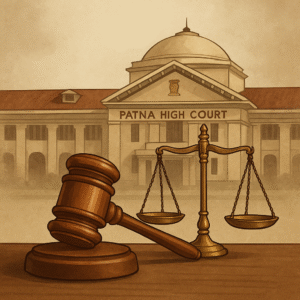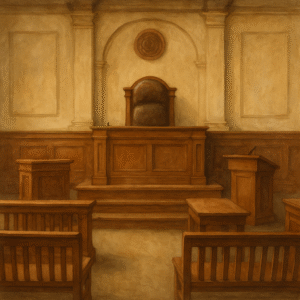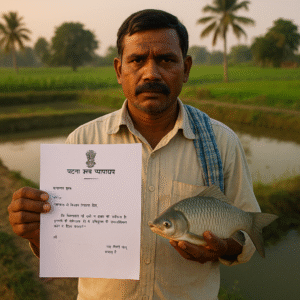Simplified Explanation of the Judgment
In this case, a catering service provider approached the Patna High Court to challenge a service tax demand order issued by the Central GST authorities. The petitioner, a registered firm engaged in providing catering services on Indian Railways trains, was directed to pay over ₹1.38 crore in service tax, along with an equal penalty and applicable interest. This demand was raised for the period between 2014 and 2017, based on the license fee paid by the petitioner to Indian Railways for providing catering services under contract.
The department’s core argument was that the license fee paid to Indian Railways constituted consideration for “support services,” making it taxable under the reverse charge mechanism (RCM). The petitioner was alleged to have not declared or paid the service tax on this amount, triggering the demand.
According to the tax department, the Indian Railways provided several logistical and infrastructural facilities to the caterer—such as pantry cars, water and storage facilities, and travel passes—which amounted to support services. Under applicable service tax provisions, such services were not part of the negative list and were therefore taxable. The tax liability was placed on the recipient, i.e., the catering contractor.
The petitioner challenged this demand on multiple grounds:
- That the order was passed without giving due consideration to replies and legal arguments.
- That no pre-show cause consultation was held, which was mandatory under CBEC guidelines.
- That the demand was time-barred under Section 73(1) of the Finance Act, 1994.
- That the licensing activity by Indian Railways did not amount to “support services” under the law.
The petitioner also argued that this was a case of legal interpretation rather than tax evasion and that penalty under Section 78 was not warranted.
However, the tax department countered that the case involved suppression of facts, which allowed it to invoke the extended five-year limitation period under the proviso to Section 73(1). It further argued that all procedural requirements were fulfilled and that the petitioner had access to an alternative statutory remedy via appeal, which had not been pursued.
After hearing both sides, the Patna High Court observed that the issues raised—such as whether the services constituted “support services,” whether there was suppression of facts, and whether the extended limitation applied—required factual and legal scrutiny, best suited for an appellate authority.
The Court therefore declined to entertain the writ petition and directed the petitioner to approach the statutory appellate authority under Section 85 of the Finance Act, 1994. The petitioner was given eight weeks to file an appeal, and the appellate authority was directed to consider the issue of limitation sympathetically due to the pendency of the writ.
Significance or Implication of the Judgment
This judgment reinforces that taxpayers must exhaust alternative remedies, such as statutory appeals, before approaching High Courts under Article 226. It also underscores the department’s stance that license fees paid to Indian Railways for commercial contracts like catering may be taxable under the reverse charge mechanism as “support services.”
Businesses contracting with government bodies for infrastructure or logistical support must assess their service tax liability carefully. Failure to pay taxes on such transactions may lead to demands involving tax, interest, and steep penalties, especially when extended limitation periods are invoked due to alleged suppression.
Legal Issue(s) Decided and the Court’s Decision with Reasoning
- Whether license fee paid to Indian Railways is taxable under service tax law as “support services”?
- Held: This is a factual and legal issue to be decided by the appellate authority. Court declined to interfere at writ stage.
- Whether the show cause notice and demand are invalid due to absence of pre-SCN consultation?
- Held: Petitioner did not challenge the SCN at the appropriate stage. The issue was not raised during personal hearing. Hence, not entertained.
- Whether the extended limitation period under Section 73(1) could be invoked?
- Held: Since the adjudicating authority found wilful suppression of facts, the issue falls within the scope of the extended limitation. Court declined to interfere with factual findings in writ jurisdiction.
- Whether writ petition should be entertained when alternative remedy of appeal exists?
- Held: No. Petitioner was advised to approach appellate authority.
Judgments Referred by Parties (with citations)
- Amadeus India Pvt. Ltd. vs. Principal Commissioner, Central Excise (2019 SCC OnLine Del 8437)
- Cosmic Dye Chemical vs. CCE, Bombay [(1995) 6 SCC 117]
- CCE Bangalore vs. Karnataka Agro Chemicals [(2008) 7 SCC 343]
- Northern Operating Systems Pvt. Ltd. [(2022) 17 SCC 90]
- Collector of Central Excise vs. H.M.M. Ltd. [1995 Supp (3) SCC 322]
Judgments Relied Upon or Cited by Court (with citations)
- Godrej Sara Lee Ltd. vs. Excise and Taxation Officer [2023 SCC OnLine SC 95]
- State of Maharashtra vs. Greatship (India) Ltd. [Civil Appeal No. 4956 of 2022]
- M/s Kelkar and Kelkar vs. M/s Hotel Pride Exec. Pvt. Ltd. [Civil Appeal No. 3479 of 2022]
- CWJC No. 10644 of 2024, Ramnath Prasad vs. Principal Commissioner of CGST [Patna High Court]
- CWJC No. 4541 of 2024, M/s Mangalmurti Constructions vs. Union of India
Case Title
M/s Singh Caterers and Vendors vs. Directorate General of GST Intelligence & Others
Case Number
CWJC No. 3390 of 2023
Coram and Names of Judges
Hon’ble Mr. Justice Rajeev Ranjan Prasad
Hon’ble Mr. Justice Ramesh Chand Malviya
Names of Advocates and Who They Appeared For
- For Petitioner: Mr. Gautam Kejriwal, Mr. Mohit Agrawal, Mr. Lokesh Kumar, Mr. Akash Kumar
- For Respondents: Mr. K.N. Singh (ASGI), Mr. Anshuman Singh (Sr. SC, CGST & CX), Mr. Shivaditya Shahi Sinha
Link to Judgment
6c7b20bc-af77-49b2-aea1-3d197307a494.pdf
If you found this explanation helpful and wish to stay informed about how legal developments may affect your rights in Bihar, you may consider following Samvida Law Associates for more updates.








